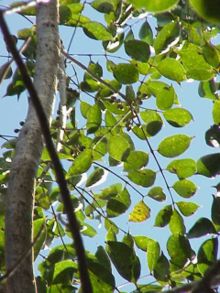Bursera
| Bursera | |
|---|---|

| |
| Bursera simaruba | |
| Scientific classification | |
| Kingdom: | Plantae |
| Clade: | Tracheophytes |
| Clade: | Angiosperms |
| Clade: | Eudicots |
| Clade: | Rosids |
| Order: | Sapindales |
| Family: | Burseraceae |
| Genus: | Bursera Jacq. ex L.[1] |
| Type species | |
| Bursera simaruba | |
| Species | |
|
About 100, see text. | |
| Synonyms | |
|
Elaphrium Jacq. | |
Bursera is a genus with about 100 described species[2] of flowering shrubs and trees varying in size up to 25 m (82 ft) high. It is the type genus for Burseraceae. The trees are native (often for many species endemic) to the Americas, from the southern United States south through to northern Argentina, in tropical and warm temperate forest habitats. It is named after the 17th-century Danish botanist Joachim Burser.
Several Mexican species (such as B. aloexylon and B. delpechiana) produce a type of wood of known as linaloe (from Mexican Spanish lináloe, from Latin lignum aloes, lit. 'wood of the aloe' or 'aloeswood (agalloch)').[3] They contain the aromatic oil linalool.
A number of species from tropical Asia were once included in this genus, but are now treated in the genus Protium.
Species
Formerly placed here
- Canarium paniculatum (Lam.) Benth. ex Engl. (as B. paniculata Lam.)
- Protium serratum (Wall. ex Colebr.) Engl. (as B. serrata Wall. ex Colebr.)[5]
Uses
- Caranna, medicinal gum
Gallery
-
Bursera penicillata trunks
-
Bursera penicillata fruits and leaves
-
Bursera penicillata trunk
References
- ^ "Genus: Bursera Jacq. ex L." Germplasm Resources Information Network. United States Department of Agriculture. 2007-10-05. Archived from the original on 2009-05-07. Retrieved 2010-11-18.
- ^ a b Becerra, Judith X.; D. Lawrence Venable (2008). Rees, Mark (ed.). "Sources and Sinks of Diversification and Conservation Priorities for the Mexican Tropical Dry Forest". PLoS ONE. 3 (10): e3436. doi:10.1371/journal.pone.0003436. PMC 2562985. PMID 18927613.
no
{{cite journal}}: CS1 maint: unflagged free DOI (link) - ^ "linaloe". Merriam-Webster.com Dictionary. Merriam-Webster.
- ^ Becerra, Judith X.; Noge, Koji (2010). "The Mexican roots of the Indian lavender tree". Acta Botanica Mexicana. 91: 27–36.
- ^ a b "GRIN Species Records of Bursera". Germplasm Resources Information Network. United States Department of Agriculture. Archived from the original on 2009-01-20. Retrieved 2010-11-18.
External links



